| Listing 1 - 10 of 29 | << page >> |
Sort by
|
Book
ISBN: 2551045398 2551045401 255104541X 9782551045402 9782551045419 9782551045396 Year: 1982 Publisher: Québec : Gouvernement du Québec. Office de la langue française,
Abstract | Keywords | Export | Availability | Bookmark
 Loading...
Loading...Choose an application
- Reference Manager
- EndNote
- RefWorks (Direct export to RefWorks)
Canadianisms, French --- French language --- Popular culture --- Spoken French --- Syntax. --- Syntax
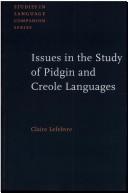
ISBN: 9027230803 158811516X 9786613280282 9027281858 1283280280 9789027281852 9789027230805 9781588115164 Year: 2004 Volume: 70 Publisher: Amsterdam Benjamins
Abstract | Keywords | Export | Availability | Bookmark
 Loading...
Loading...Choose an application
- Reference Manager
- EndNote
- RefWorks (Direct export to RefWorks)
The content of this book is concerned with various issues at stake in Creole studies that are also of interest for general linguistics. These include the general issue of Creole genesis and of the accelerated linguistic change that characterizes the emergence of these languages as compared to ordinary cases of linguistic change, the problem of the development of morphology in incipient Creoles, the problem of the validity of data in linguistic analysis, the issue of multifunctionality as regards the concept of lexical entry, the question of whether Creole languages are semantically more transp
Creole dialects, French --- Creole dialects. --- Pidgin languages. --- Creole dialects --- Creole languages --- Creolisering --- Creolization --- Creolized languages --- Creools --- Creoolse dialecten --- Creoolse talen --- Créoles [Dialectes ] --- Créoles [Parlers ] --- Créolisation --- Dialectes créoles --- Hybrid languages --- Jargons --- Kreools --- Kreoolse dialecten --- Parlers créoles --- Pidgin languages --- Pidgins --- Pidgintalen --- Creolan languages --- French language --- Dialectology --- Contact vernaculars --- Pidgeon languages --- Pigeon languages --- Lingua francas --- Languages, Mixed --- Creole dialects [French ] --- Haiti --- PIDGIN (LANGUES) --- LANGUES CREOLES --- LANGUES CREOLES (FRANCAISES) --- HAITI --- Pidgin-English (langue) --- Langues créoles --- Langues créoles. --- Créole haïtien (langue)
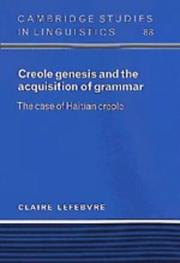
ISBN: 0521593824 0521025389 0511519826 9780521025386 9780511519826 9780521593823 Year: 1989 Publisher: Cambridge Cambridge University Press
Abstract | Keywords | Export | Availability | Bookmark
 Loading...
Loading...Choose an application
- Reference Manager
- EndNote
- RefWorks (Direct export to RefWorks)
This study focuses on the cognitive processes involved in creole genesis - relexification, reanalysis and direct levelling - processes which the author demonstrates play a significant role in language genesis and change in general. Dr Lefebvre argues that the creators of pidgins/creoles use the parametric values of their native languages in establishing those of the language that they are creating and the semantic principles of their own grammar in concatenating morphemes and words in the new language. This theory is documented on the basis of a uniquely detailed comparison of Haitian creole with its contributing French and West African languages. Summarizing more than twenty years of funded research, the author examines the input of adult, as opposed to child, speakers and resolves the problems in the three main approaches, universalist, superstratist and substratist, which have been central to the recent debate on creole development.
Grammar --- Psycholinguistics --- Dialectology --- Pidgin --- Creolan languages --- Haiti --- Arts and Humanities --- Language & Linguistics --- Creole dialects. --- Pidgin languages. --- Psycholinguistics. --- Second language acquisition. --- Creole dialects, French --- Creole languages --- Creolized languages --- Languages, Mixed --- Pidgin languages --- French Creole languages --- Second language learning --- Language acquisition --- Language, Psychology of --- Language and languages --- Psychology of language --- Speech --- Linguistics --- Psychology --- Thought and thinking --- Contact vernaculars --- Hybrid languages --- Jargons --- Pidgeon languages --- Pigeon languages --- Lingua francas --- Grammar. --- Psychological aspects --- Creole dialects --- Second language acquisition --- Creole dialects, French - Haiti - Grammar
Book
ISBN: 9789027252746 9027252742 9789027268259 9027268258 Year: 2015 Publisher: Amsterdam, Netherlands Philadelphia, PA
Abstract | Keywords | Export | Availability | Bookmark
 Loading...
Loading...Choose an application
- Reference Manager
- EndNote
- RefWorks (Direct export to RefWorks)
This chapter discusses the material presented in this book organized around the various themes announced in the Introduction, and it addresses questions and comments pertinent to the issues related to these themes. The first theme to be addressed is the question of the similarity between the subsystems of functional categories between the three creoles. The second theme relates to the processes at work in the formation of the functional categories of these three creoles. Relabeling, grammaticalization and leveling will be discussed in turn. A discussion of phenomena, such as restructuring and
Creole dialects --- Languages in contact --- Bilingualism --- Minimalist theory (Linguistics). --- Sociolinguistics --- Saramaccan language. --- Haitian. --- Papiamentu. --- Caribbean Area. --- Minimalist theory (Linguistics) --- Language and languages --- Language and society --- Society and language --- Sociology of language --- Language and culture --- Linguistics --- Sociology --- Integrational linguistics (Oxford school) --- Generative grammar --- Multilingualism --- Creole languages --- Creolized languages --- Languages, Mixed --- Pidgin languages --- Areal linguistics --- Social aspects --- Sociological aspects
Book
ISBN: 9027223246 155619384X 9786613424501 9027277648 1283424509 9789027277640 9781283424509 6613424501 Year: 1991 Publisher: Amsterdam Benjamins
Abstract | Keywords | Export | Availability | Bookmark
 Loading...
Loading...Choose an application
- Reference Manager
- EndNote
- RefWorks (Direct export to RefWorks)
The papers in this volume offer several analyses of verb serialization written within various theoretical frameworks: grammatical, comparative and cognitive/functional. They cover a wide range of language families. All authors address two basic questions about verb serialization: First, what is the structure and thematic constitution of the construction? The answers to this question cover the spectrum of the options that are available in current grammatical theory. Second, what aspect of the grammar differentiates between languages which have serial constructions and those which do not? The specific proposals made by the authors are discussed by R. Larson in the concluding paper. Larson opens new perspectives for research on verb serialization by posing the following question: what analogues for verb serialization can be found in the more familiar grammatical apparatus of English? It is suggested that verb serialization finds a clear parallel in the secondary predicate structures of English.
Grammar --- Comparative linguistics --- Grammar, Comparative and general --- Verb --- Verb. --- Verb phrase --- Verbals --- Reflexives --- Linguistics --- Philology
Book
ISBN: 1283006618 9786613006615 9027287430 9789027287434 9781283006613 9789027206763 9027206767 6613006610 Year: 2011 Publisher: Amsterdam Benjamins
Abstract | Keywords | Export | Availability | Bookmark
 Loading...
Loading...Choose an application
- Reference Manager
- EndNote
- RefWorks (Direct export to RefWorks)
The distinct social origin of creoles, along with pidgins and mixed languages, makes them a source of interest to typologists, given their interest in the cross-linguistic distribution of structural feature values. Typologists, like creolists before them, are interested in issues such as whether creoles have a distinct typological profile and how creoles have been shaped by the processes that led to their formation. However, typologists can also provide important tools to help creolists in answering these questions, in particular enabling them to see properties of creole languages against the general background of cross-linguistic variation in the world. This article examines a number of phenomena in creole languages from a typological perspective, in particular issues of simplification, substrate influence, and superstrate influence.
Creole dialects. --- Typology (Linguistics) --- Grammar, Comparative and general --- Language and languages --- Linguistic typology --- Linguistics --- Linguistic universals --- Creole languages --- Creolized languages --- Languages, Mixed --- Pidgin languages --- Typology --- Classification --- Creole dialects
Book
ISBN: 9780199945313 9780199945290 Year: 2015 Publisher: Oxford Oxford University Press
Abstract | Keywords | Export | Availability | Bookmark
 Loading...
Loading...Choose an application
- Reference Manager
- EndNote
- RefWorks (Direct export to RefWorks)
Dialectology --- Sociolinguistics --- Psycholinguistics --- Creolan languages
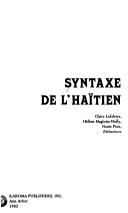
ISBN: 0897200551 Year: 1982 Publisher: Ann Arbor Karoma
Abstract | Keywords | Export | Availability | Bookmark
 Loading...
Loading...Choose an application
- Reference Manager
- EndNote
- RefWorks (Direct export to RefWorks)
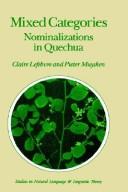
ISBN: 1556080506 1556080514 9400934033 Year: 1988 Publisher: Dordrecht Kluwer Academic
Abstract | Keywords | Export | Availability | Bookmark
 Loading...
Loading...Choose an application
- Reference Manager
- EndNote
- RefWorks (Direct export to RefWorks)
Quechua --- Grammar --- Quechua language --- Nominals.
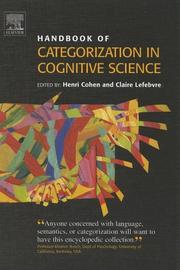
ISBN: 0080446124 9780081011072 9780128097663 9786610630189 1280630183 008045741X 9780080457413 9780080446127 9781280630187 6610630186 0128097663 0081011075 Year: 2017 Publisher: Amsterdam : Elsevier,
Abstract | Keywords | Export | Availability | Bookmark
 Loading...
Loading...Choose an application
- Reference Manager
- EndNote
- RefWorks (Direct export to RefWorks)
Categorization, the basic cognitive process of arranging objects into categories, is a fundamental process in human and machine intelligence and is central to investigations and research in cognitive science. Until now, categorization has been approached from singular disciplinary perspectives with little overlap or communication between the disciplines involved (Linguistics, Psychology, Philosophy, Neuroscience, Computer Science, Cognitive Anthropology). Henri Cohen and Claire Lefebvre have gathered together a stellar collection of contributors in this unique, ambitious attempt to bring toget
Cognitive psychology --- Psycholinguistics --- Categorization (Psychology) --- Cognitive science --- Catégorisation (Psychologie) --- Sciences cognitives --- Science --- Philosophy of mind --- Classification (Psychology) --- Abstraction --- Cognitive science.
| Listing 1 - 10 of 29 | << page >> |
Sort by
|

 Search
Search Feedback
Feedback About UniCat
About UniCat  Help
Help News
News